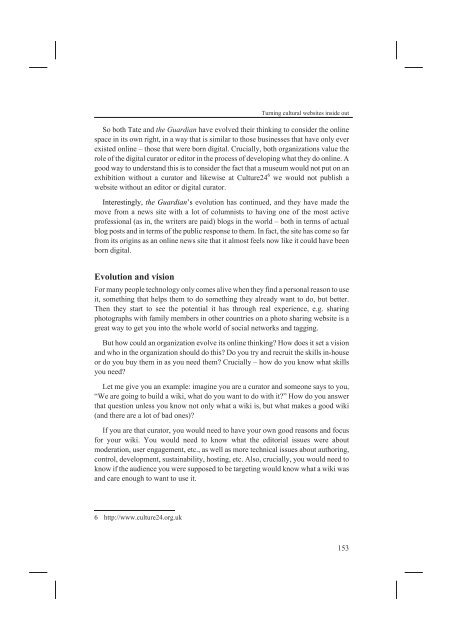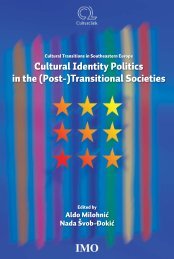D:\Documents and Settings\Ana\My Documents\Biserka-knjiga ...
D:\Documents and Settings\Ana\My Documents\Biserka-knjiga ...
D:\Documents and Settings\Ana\My Documents\Biserka-knjiga ...
Create successful ePaper yourself
Turn your PDF publications into a flip-book with our unique Google optimized e-Paper software.
So both Tate <strong>and</strong> the Guardian have evolved their thinking to consider the online<br />
space in its own right, in a way that is similar to those businesses that have only ever<br />
existed online – those that were born digital. Crucially, both organizations value the<br />
role of the digital curator or editor in the process of developing what they do online. A<br />
good way to underst<strong>and</strong> this is to consider the fact that a museum would not put on an<br />
exhibition without a curator <strong>and</strong> likewise at Culture24 6 we would not publish a<br />
website without an editor or digital curator.<br />
Interestingly, the Guardian’s evolution has continued, <strong>and</strong> they have made the<br />
move from a news site with a lot of columnists to having one of the most active<br />
professional (as in, the writers are paid) blogs in the world – both in terms of actual<br />
blog posts <strong>and</strong> in terms of the public response to them. In fact, the site has come so far<br />
from its origins as an online news site that it almost feels now like it could have been<br />
born digital.<br />
Evolution <strong>and</strong> vision<br />
For many people technology only comes alive when they find a personal reason to use<br />
it, something that helps them to do something they already want to do, but better.<br />
Then they start to see the potential it has through real experience, e.g. sharing<br />
photographs with family members in other countries on a photo sharing website is a<br />
great way to get you into the whole world of social networks <strong>and</strong> tagging.<br />
But how could an organization evolve its online thinking? How does it set a vision<br />
<strong>and</strong> who in the organization should do this? Do you try <strong>and</strong> recruit the skills in-house<br />
or do you buy them in as you need them? Crucially – how do you know what skills<br />
you need?<br />
Let me give you an example: imagine you are a curator <strong>and</strong> someone says to you,<br />
“We are going to build a wiki, what do you want to do with it?” How do you answer<br />
that question unless you know not only what a wiki is, but what makes a good wiki<br />
(<strong>and</strong> there are a lot of bad ones)?<br />
If you are that curator, you would need to have your own good reasons <strong>and</strong> focus<br />
for your wiki. You would need to know what the editorial issues were about<br />
moderation, user engagement, etc., as well as more technical issues about authoring,<br />
control, development, sustainability, hosting, etc. Also, crucially, you would need to<br />
know if the audience you were supposed to be targeting would know what a wiki was<br />
<strong>and</strong> care enough to want to use it.<br />
6 http://www.culture24.org.uk<br />
Turning cultural websites inside out<br />
153



